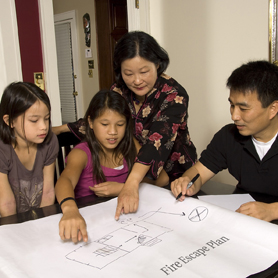In the event of a fire, remember that every second counts, so you and your family must always be prepared. Escape plans help you get out of your home quickly. In less than 30 seconds, a small flame can get completely out of control and turn into a major fire. It only takes minutes for a house to fill  with thick black smoke and become engulfed in flames.
with thick black smoke and become engulfed in flames.
Prepare and practice your fire escape plan with everyone in your household, including children and people with disabilites. It is a good idea to practice your plan with overnight guests. Some tips to consider when preparing your escape plan include:
- Draw a map of each level of your home and show all doors and windows. Find two ways to get out of each room. Make sure all doors and windows that lead outside open easily.
- Only purchase collapsible escape ladders evaluated by a recognized testing laboratory. Use the ladder only in a real emergency.
- Teach children how to escape on their own in case you cannot help them. Have a plan for everyone in your home who has a disability.
- Practice your fire escape plan at night and during the daytime.
.
Have Two Ways Out Video
Click here to view the Do You Know Two Ways Out video above.
Security Bars Require Special Precautions
Security bars may help to keep your family safe from intruders, but they can also trap you inside in the event of a deadly fire! Windows and doors with security bars must have quick release devices to allow them to be opened immediately in an emergency. Make sure everyone in the family understands and practices how to properly operate and open locked or barred doors and windows.
Immediately Leave the Home
When a fire occurs, do not waste any time saving property. Take the safest exit route, but if you must escape through smoke, remember to crawl low, under the smoke and keep your mouth covered. The smoke contains toxic gases, which can disorient you or, at worst, overcome you.
Never Open Doors that are Hot to the Touch
When you come to a closed door, use the back of your hand to feel the top of the door, the doorknob, and the crack between the door and door frame to make sure that fire is not on the other side. If it feels hot, use your secondary escape route. Even if the door feels cool, open it carefully. Brace your shoulder against the door and open it slowly. If heat and smoke come in, slam the door and make sure it is securely closed, then use your alternate escape route.
Designate a Meeting Place Outside and Take Attendance
Designate a meeting location away from the home, but not necessarily across the street. For example, meet under a specific tree or at the end of the driveway or front sidewalk to make sure everyone has gotten out safely and no one will be hurt looking for someone who is already safe. Designate one person to go to a neighbor's home to phone the fire department.
Once Out, Stay Out
Remember to escape first and then notify the fire department using the 9-1-1 system or proper local emergency number in your area. Never go back into a burning building for any reason. Teach children not to hide from firefighters. If someone is missing, tell the firefighters. They are equipped to perform rescues safely.
How Fire-Safe Is Your Home?
You won’t know until you do a fire safety walkthrough
Conduct a fire safety walkthrough of your home on a regular basis. Use the following tips to help you in your walkthrough:
- Keep clothes, blankets, curtains, towels and other items that can easily catch on fire at least three feet from space heaters, and away from stove burners.
- Place space heaters where they will not tip over easily.
- Have chimneys cleaned and inspected every year by a professional.
- Clear the area around trash, flammables and decorative materials.
- Always use a metal mesh screen with fireplaces and leave glass doors open while burning a fire.
- Never leave cooking unattended.
- Be sure your stove and small appliances are off before going to bed.
- Check for worn wires and do not run cords under rugs or furniture.
- Never overload electrical sockets.
- Keep lighters and matches out of the reach of children.
- Never leave cigarettes unattended and never smoke in bed.
- Make sure cigarettes and ashes are out. The cigarette needs to be completely stubbed out in the ashtray or run under water.